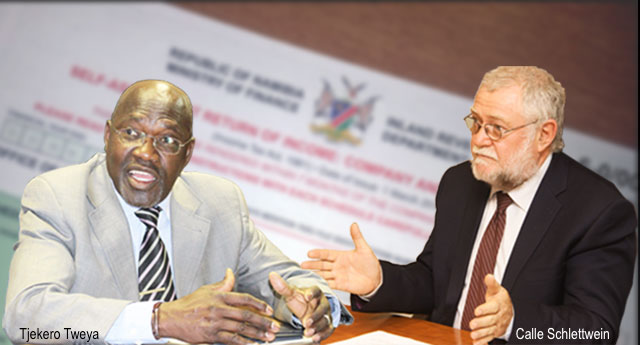By Mathias Haufiku and Tileni Mongudhi | 24 September 2019
FINANCE minister Calle Schlettwein and trade minister Tjekero Tweya clashed over plans to abolish a policy that exempts some investors from paying taxes.
Schlettwein is against this special treatment of Export Processing Zones (EPZs) while Tweya is pulling in the other direction, accusing his counterpart of blocking development.
Namibia introduced the EPZ regime in 1995 as a tax incentive to attract export-driven manufacturing companies.
Beneficiaries are exempted from paying various taxes, including corporate income tax, stamp and excise duties, as well as value-added tax on purchases of equipment and raw materials imported into Namibia.
The government hoped that, in return, these companies would bring technology, money, skills, jobs and boost foreign currency reserves.
But this arrangement has turned out to be like a poisoned chalice.
Some companies that benefited from these incentives failed and others fear that it could get worse if the incentives are scrapped. To Schlettwein, these tax-free incentives are part of the reason why Namibia was blacklisted by the European Union (EU) for having harmful tax practices.
“The factual situation is that Namibia’s EPZs were not achieving the targets they were set up, for example employment creation, growth and improved revenue streams,” he told The Namibian on Saturday.
He continued: “To the contrary, they resulted to be a net loss because we forfeited more income through the tax holiday for EPZ than additional tax revenue through improved economic activity”.
Schlettwein said, the majority of EPZ entities are in the mining sector that are not labour intensive.
“Those entities unfortunately used their tax-free status to transfer profits out of the Namibia which in turn resulted in a net loss for Namibia. There is good economic reason to abandon the existing EPZ regime,” the minister added.
Schlettwein said Cabinet agreed to abolish the EPZ regime and replace it with the Special Economic Zone Framework.
“We, however, have to be circumspect about the long-term rights that have been granted to EPZ entities. The replacing legal framework needs to respect the rights of the existing EPZ holders without unwanted harmful and unwanted negative effects,” he added.
The minister said EPZ regimes are considered harmful tax practices internationally.
“Namibia is member to a number of multilateral and bilateral protocols and our full compliance may not be placed in jeopardy. We are now in the process of drafting the needed legislation to reflect this fine balance to ensure that Namibia’s industrial ambition is not compromised,” Schlettwein.
The future of EPZs has exposed division between the finance ministry and their counterparts at trade.
Finance ministry sources said Schlettwein wants to pull the plug on EPZs by the end of this year.
The trade ministry is, however, not impressed.
Tweya told The Namibian last week: “The [trade] ministry has provided a solution to unlock the economic hostage and you should ask those wanting to keep it blocked why they are doing it”.
Trade ministry officials said EPZs should be replaced before they are abolished.
“We must consult those investors who hold EPZ status and gradually implement the Cabinet directive once an alternative is found. Abruptly ending EPZs could collapse many companies,” a trade ministry official said.
Official statistics show that there are currently 19 companies benefiting from the EPZ regime with a total investment of N$11,6 billion and 2 345 jobs created. To some officials, these are not good returns.
According to statistics, EPZ beneficiary NamZinc invested the most in Namibia, with approximately N$7,7 billion worth of exports during the period under review, creating 610 jobs.
PRESSURE
Some diamond businesses warned that their investments could be in danger if the government pulls the plug on the EPZ regime. Diamond cutting and polishing factories could pay export levies on rough and polished diamonds calculated at 1% and 0,5% if the EPZ regime is abolished. Finestar Jewellery, a diamond polishing company that applied for an EPZ status in November 2018 said it cannot start operating because their EPZ application is still in progress.
The company wrote to Tweya on 26 June 2019 asking him to intervene in their application made via the Namibia Industrial Development Agency (Nida), a state agency that processes EPZ requests.
“The company is unable to start cutting and polishing rough diamonds because the EPZ licence application is still in progress. This is a discomfort for the company as we acquired a factory building in August 2018, as per the licence and security requirement,” Finestar director Vinod Jain said in a letter.
The company said it can’t import machines or appoint workers to start operations.
The Diamond Manufacturers Association of Namibia (Diaman) said the diamond polishing industry pumps over N$2 billion into the economy every year.
Diaman, which represents 11 diamond cutting and polishing factories in Namibia that all enjoy EPZ status, says the sector employs close to 1500 Namibians.
Diaman wrote to Schlettwein in June 2018 saying the diamond polishing and cutting industry “will not be able to remain in Namibia without the VAT incentive that we currently enjoy.”
Diaman is worried that the VAT incurred monthly could strangle the industry because of the long waiting periods it takes the government to pay VAT refunds.
There is, however, evidence that the diamond polishing industry collapsed over the years despite tax-free benefits.
The Namibian reported in 2015 that only four of the once thriving 13 factories remain in operation.
That report quoted managing director of a Windhoek-based factory Hardstone Processing, Burhan Seber, who said “the factories are now like ghost towns. The few factories in production are only trying to survive”.
In fact, former mines minister Obeth Kandjoze announced in 2015 that 700 people had lost their jobs.
A document seen by The Namibian states that the main focus of the SEZ is to attract Namibian and foreign investments to promote the country’s export sector.
The new policy proposes that SEZ developers must be given exemption from paying corporate tax for the first five years, customs duties reduction, 10% tax on dividends and preferential land lease.
The targeted industries are agriculture, manufacturing, vehicle, chemical, jewellery, mineral processing, medicine, tourism and film making.






